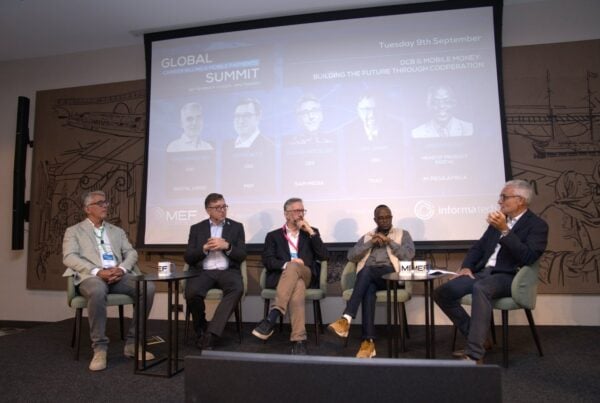Personalisation is no longer a buzzword but a strategic imperative shaping mobile commerce, identity, and customer engagement. A recent Meta-Deloitte report highlights trust, regulation, AI, and cross-functional collaboration as critical to success. While mobile remains the most personal channel, demanding privacy-first strategies, MEF CEO Dario Betti suggests this is both a challenge and opportunity for the mobile ecosystem.
Personalisation has become more than a marketing buzzword; it’s emerging as a strategic imperative across digital services.

A recent report commissioned by Meta and produced by Deloitte, “The Path to Personalisation” , offers timely insights into how businesses are using data and technology to tailor customer experiences. The implications go far beyond advertising and brand loyalty—they touch on trust, regulation, consumer empowerment, and the evolving role of mobile and AI within the ecosystem.
At MEF, we view this report as highly relevant for the mobile industry—from telcos and CPaaS players to app developers, content providers, and identity service enablers. The mobile device remains the most personal piece of technology people own. Understanding how to personalise responsibly—and effectively—will shape the future of mobile commerce, messaging, identity, and customer engagement.
Personalisation: A Market Imperative
Personalisation as this Meta-Deloitte report outlines, it’s a competitive differentiator, but only when implemented responsibly, transparently, and strategically.”
According to Deloitte, 80% of U.S. consumers are more likely to purchase from brands that offer personalised experiences. This trend is accelerating globally as consumer expectations evolve. Personalisation now drives customer satisfaction, loyalty, and spend: on average, customers spend 50% more with brands that get it right.
But this isn’t only about dynamic emails or tailored recommendations. Personalisation is increasingly embedded in the entire mobile experience—from UI/UX on apps to personalised messaging, targeted notifications, and predictive customer support.
For example, brands leveraging first-party data can remind shoppers to buy items they’ve recently browsed or forgotten in their cart, increasing conversion. Streaming services can tailor thumbnails and recommendations based on viewing behaviour. Retailers can deliver custom promotions based on purchase history or geolocation data. These micro-moments, when executed with precision and trust, become key differentiators in crowded markets.
Technology as the Enabler—But Not the Only Solution
Yet the report also offers a word of caution. Technology maturity varies widely across industries and organisations. Deloitte introduces a “Personalisation Maturity Framework,” outlining four levels:
- Low: Siloed data, generic customer experiences, basic segmentation.
- Medium: Limited tailoring, some automation, early-stage AI/ML usage.
- High: Unified data, cross-channel alignment, advanced segmentation.
- Champions: Real-time personalisation, generative AI, customer lifecycle orchestration.
Most brands are still in the low-to-medium tier. To become “champions,” investment in infrastructure, governance, and cross-functional collaboration is critical.
Data Is the Fuel—Trust Is the Licence to Operate
Personalisation cannot exist without data—and increasingly, that data comes from mobile touchpoints. First-party data collected via mobile apps, messaging platforms, or operator services is more valuable than ever.
But trust is paramount. The report makes clear that 66% of consumers expect companies to understand their needs, yet they are cautious about how their data is used. In Europe, 73% of consumers responded positively to ads containing useful information for products they were already intending to buy. But they also expect transparency, control, and privacy.
Brands that fail to respect user preferences or mismanage consent risk losing not only customers but regulatory compliance. As GDPR, and other frameworks evolve, so must the personalisation strategies. Companies need robust systems for consent management, data protection, and ethical AI deployment. This is especially vital in mobile, where identifiers (such as device IDs, phone numbers, or SIM profiles) are deeply linked to identity and behaviour.
The report outlines best practices:
- Offer clear and easy-to-understand privacy settings.
- Regularly communicate how data is used and updated.
- Use transparent language rather than legal jargon.
The message is simple: without trust, personalisation fails.
A Holistic, Cross-Functional Approach
One of the strongest messages in the report is that personalisation is not just a marketing problem—it requires an organisation-wide commitment. Deloitte advocates for “cross-functional collaboration,” where departments from marketing to IT, data science, customer service, product design, and compliance work together.
Leading brands have established internal steering committees for personalisation and AI governance. These include:
- Executive sponsors who align initiatives with strategy.
- Marketing teams to craft and deliver personalised content.
- Data and technology teams to manage infrastructure and security.
- Product and operations teams to execute personalisation in service delivery.
- Compliance officers to manage ethical and legal risks.
For MEF members, this underscores the importance of internal alignment—particularly for telecom and platform providers rolling out AI-powered tools, identity services, or messaging solutions that leverage user behaviour data.
What It Means for the Mobile Ecosystem
From a mobile ecosystem perspective, the implications are significant. Here are three takeaways for MEF members:
1. Mobile is a critical personalisation channel
Telecom providers, CPaaS platforms, and app developers all play a role in enabling personalised experiences—whether through APIs, identity, messaging, or UX. Mobile-first personalisation strategies need to prioritise privacy, opt-in mechanisms, and responsible data use.
2. Regulation and trust will define success
Personalisation strategies must evolve in tandem with global privacy laws. The mobile industry must advocate for standards that allow innovation while respecting user rights. We may see greater emphasis on decentralised identity, zero-party data, and secure consent frameworks.
3. AI maturity is the next frontier
As generative AI tools become embedded in content creation, chatbots, and decision engines, mobile brands must evaluate their AI readiness. The industry has a chance to leapfrog, but only if supported by governance, data quality, and business alignment.
Final Thoughts
Personalisation as this Meta-Deloitte report outlines, it’s a competitive differentiator, but only when implemented responsibly, transparently, and strategically.
For the mobile industry, this is both a challenge and an opportunity. We sit at the intersection of trust, identity, and engagement. As such, we must champion personalisation practices that empower users, respect privacy, and harness the full power of technology.
Now is the time for MEF members—and the broader mobile ecosystem—to embrace the next evolution in personalised, data-driven experiences.





